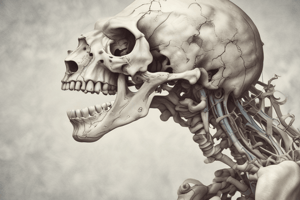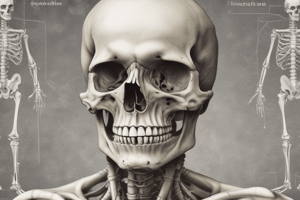Podcast
Questions and Answers
What is the genetic abnormality associated with Ewing's sarcoma?
What is the genetic abnormality associated with Ewing's sarcoma?
Which clinical presentation is characteristic of Osteogenesis Imperfecta?
Which clinical presentation is characteristic of Osteogenesis Imperfecta?
Which of the following conditions is associated with a carbonic anhydrase mutation?
Which of the following conditions is associated with a carbonic anhydrase mutation?
What is the common laboratory diagnostic tool used for osteoporosis?
What is the common laboratory diagnostic tool used for osteoporosis?
Signup and view all the answers
Which abnormal lab finding is typically associated with renal osteodystrophy?
Which abnormal lab finding is typically associated with renal osteodystrophy?
Signup and view all the answers
Which of the following is a common clinical feature of osteosarcoma?
Which of the following is a common clinical feature of osteosarcoma?
Signup and view all the answers
What is the pathophysiological abnormality linked to achondroplasia?
What is the pathophysiological abnormality linked to achondroplasia?
Signup and view all the answers
Which type of arthritis is characterized by acute onset joint pain and may require urgent treatment?
Which type of arthritis is characterized by acute onset joint pain and may require urgent treatment?
Signup and view all the answers
Which clinical presentation is specifically associated with Duchenne Muscular Dystrophy (DMD)?
Which clinical presentation is specifically associated with Duchenne Muscular Dystrophy (DMD)?
Signup and view all the answers
What is the genetic abnormality commonly associated with Becker Muscular Dystrophy (BMD)?
What is the genetic abnormality commonly associated with Becker Muscular Dystrophy (BMD)?
Signup and view all the answers
Which of the following is a diagnostic lab test for Duchenne Muscular Dystrophy (DMD)?
Which of the following is a diagnostic lab test for Duchenne Muscular Dystrophy (DMD)?
Signup and view all the answers
What is the histopathologic feature associated with gout when viewed under polarized light?
What is the histopathologic feature associated with gout when viewed under polarized light?
Signup and view all the answers
Which of the following conditions is associated with Reiter’s syndrome?
Which of the following conditions is associated with Reiter’s syndrome?
Signup and view all the answers
Which of the following is not typically included in the diagnostic approach for muscle pathology?
Which of the following is not typically included in the diagnostic approach for muscle pathology?
Signup and view all the answers
What are the distinguishing signs of dermatomyositis compared to polymyositis?
What are the distinguishing signs of dermatomyositis compared to polymyositis?
Signup and view all the answers
Which association indicates a potential connection between cancer and muscle pathology?
Which association indicates a potential connection between cancer and muscle pathology?
Signup and view all the answers
Study Notes
Bone, Joint, and Muscle Pathology Review
- This review covers bone, joint, and muscle pathologies.
- Developmental and metabolic bone diseases are a high-yield topic.
Developmental and Metabolic Bone Diseases
- Paget's disease
- Osteopetrosis
- Osteoporosis
- Achondroplasia
- OI (Osteogenesis Imperfecta)
- Vitamin D and C deficiencies
Developmental and Metabolic Bone Diseases - Common Entities
- Pertinent pathophysiology abnormalities (e.g., collagen type 1 defect in osteogenesis imperfecta, FGFR3 receptor in achondroplasia, carbonic anhydrase mutation in osteopetrosis) are key.
- Clinical presentation includes features like enlarging head size or ring size in Paget's, blue sclera in OI, and rickets features.
Developmental and Metabolic Bone Diseases - Diagnostic Labs
- Diagnostic labs include, for example, those related to renal osteodystrophy and Paget's disease.
- DEXA scans are used for osteoporosis.
- Radiologic/pathologic images are important, but only those covered in the lectures should be focused on.
- Example imaging features include sunburst and Codman's triangles in osteosarcoma, and appearance and workup of metastatic bone lesions.
Tumors and Infections of Bone
- Osteoid osteoma/osteochondroma/enchondroma
- Wilms tumor
- Osteosarcoma
- Fibrosarcoma
- Ewing's sarcoma
- Metastatic tumors
- Osteomyelitis
High Yield Topics - General Information
- Critical information about each high yield topic is provided at the beginning of each respective section in the presentation.
- Pertinent pathophysiology and unique genetic abnormalities (like RB germline mutation in osteosarcoma or EWSR1 gene mutations in Ewing's sarcoma) are highlighted.
- Clinical presentations (e.g., young person, fracture with minimal trauma, and mass lesion in osteosarcoma) are included.
- The diagnostic lab includes specific relevant tests (e.g., biopsy for benign/malignant tumors, radiographs, histopathology).
High Yield for Joint Pathology
- Osteoarthritis (DJD) and rheumatoid arthritis (RA)
- Seronegative arthropathies
- Gout and pseudogout
- Septic arthritis
Joint Pathology - Further Details
- Genetic abnormalities are important, like HLA-B27 in ankylosing spondylitis.
- Clinical presentation details are given (e.g., acute onset joint pain in gout, morning stiffness in RA).
- Diagnostic labs and images are crucial (e.g., CCP for RA, birefringence in gout/pseudogout).
Muscle Pathology
- Innervation and reinnervation
- Duchenne muscular dystrophy (DMD) and Becker muscular dystrophy (BMD)
- Congenital myopathy
- Inflammatory myopathies
- Mitochondrial myopathies
Muscle Pathology - Specific Details
- Genetic abnormalities (e.g., dystrophin gene in DMD/BMD), clinical presentations (e.g., waddling gait, calf hypertrophy in DMD), appropriate labs (e.g., dystrophin stain in muscle biopsy), and relevant pathology images are essential.
Stems, Images, and Labs
- Age, history of present illness (HPI), physical findings, and radiographic/histopathologic images (essential for solidifying your differential diagnosis and final diagnosis).
- Lab results - normal or abnormal, aiding in diagnosis.
Summary of Study Advice
- Focus on the big-picture common diseases in each category.
- Avoid minutiae, detailed physiology, treatment specifics, bone marrow, solid organ, or whole-mount imaging.
- Trimmed content may be distractors and should be reviewed.
Studying That Suits You
Use AI to generate personalized quizzes and flashcards to suit your learning preferences.
Related Documents
Description
This quiz covers various genetic abnormalities and clinical presentations related to bone diseases and disorders. Questions include details about Ewing's sarcoma, Osteogenesis Imperfecta, and other related conditions. Test your knowledge on the pathophysiological aspects and diagnostic tools associated with these conditions.




